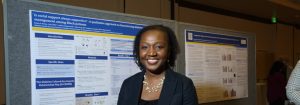Recent collaborative research sought to develop and pilot a digital interactive tool to evaluate social support and diabetes self-management among Black patients with Type 2 Diabetes. Social support can be defined as supportive actions of others that promote coping or protect against stressors.
The research team was led by Deliya Wesley, PhD, MPH, with funding from the MedStar Diabetes Research Grant. “Is social support always supportive? A Qualitative Approach to Characterizing Diabetes Self Management Among Black Patients” sought to gain experience in applying a psychosocial assessment tool, known as a Colored-Eco Genetic Relationship Map (CEGRM) to assess social support. This tool is commonly used for cancer patients but was adapted to evaluate self-management for Black patients with Type 2 Diabetes.

The research collaborators were Ashley Pantaleao, MA; Allan Fong, MS; Stephen Fernandez, MPH; and Mihriye Mete, PhD. These researchers from MedStar Health Research Institute, MedStar National Center for Human Factors in Healthcare, and the University of Maryland College Park found that despite having large social networks or high scores on social support measures, most participants indicated they keep their diabetes “to themselves” or don’t rely on their network for help with diabetes self-management.
The study included 35 adults that identify as Black or African American with Type 2 Diabetes located at MedStar Union Memorial Hospital and Shepherd’s Clinic in Baltimore. For the first phase of the study, 5 Diabetes Colored-Eco Genetic Relationship Maps (D-CEGRMs) were conducted using the traditional paper method and to test a new digital prototype using a tablet-based method. The second phase of the study used digital D-CERGMs using the tablet-based prototype along with standard structured surveys. By using color-coded symbols, the research team was able to identify the representation of both positive and negative social support that could relate to a patient’s diabetes self-management.
The analysis concluded that the D-CERGMs provided more descriptive outputs than the structured surveys. Participants found value in the D-CERGRM activity itself but some older patients were not as technologically adept and preferred something tangible vs. the tablet-based prototype. A majority of patients identified having fairly large social networks but most stated they do not share their health condition with their sources of support. Also, when it comes to diabetes self-management, participants shared different cultural and environmental barriers along with medical barriers such as issues with their glucose monitor and side effects of medication.
While a digital prototype was successfully developed for the D-CEGRM tool, significant modifications and adjustments are still needed. The study concluded that complex family structures led to complex interactions for this patient population and further analysis would need to be explored. Some of the emergent themes from the qualitative analysis included stigma and shame issues, caregiver burden, spirituality, and cultural factors. Findings further suggest that for Black patients with Type 2 Diabetes, social support may not always confer the same level of health-promoting benefits conducive to positive self-management behaviors. Patients overwhelmingly reported finding value in the process, reflection, and visualization of the dynamics of social support in their networks using the D-CEGRM.
This research was presented as part of the MedStar Health Teaching and Research Scholars Capstone event, which culminates both the two-year programs.

